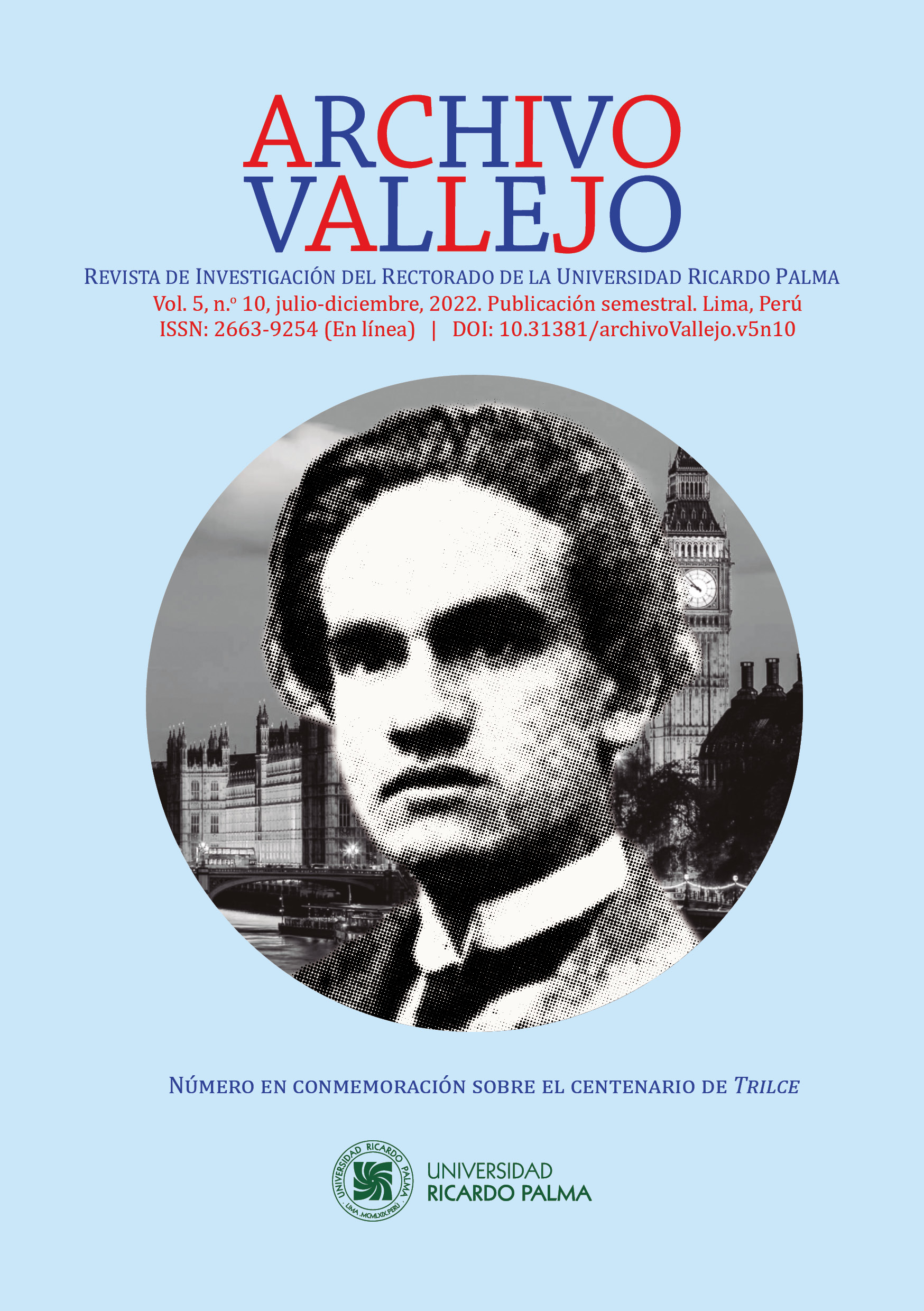Exile in James Joyce (1882-1941) and César Vallejo (1892-1938)
DOI:
https://doi.org/10.31381/archivoVallejo.v5n10.5318Keywords:
César Vallejo, James Joyce, exile, religion, political revolution, linguistic revolutionAbstract
This essay focuses on the biographical, social, cultural, and literary overlaps and coincidences that exist between the lives and works of two great twentieth-century writers, the Irish novelist James Joyce (1882-1941) and the Peruvian poet César Vallejo (1892-1938). Although they never met, both lived in Paris during the 1920s and 1930s; and although neither read the other’s writings, there are striking similarities between their respective works. Both shared an anguished relationship with Catholicism, were also involved in left-wing politics, and were fascinated by the creative possibilities of wordplay (both are known for their extensive use of neologisms). This led both Joyce and Vallejo to rely on the «ear» —rather than the «eye»— in writing their masterpieces. Finally, their works demonstrate a coincidence in the use of certain topics, such as the focus on the contrast between oral communication and anal production, as well as the exploration of absurdity and paradox (the squared circle, the upside-down world, and the «sound» of silence).
References
Alighieri, D. (1933). La divina commedia. Casa editrice Giuseppe Laterza & Figli.
Atherton, J. S. (1959). The Books at the Wake: A Study of Literary Allusion in James Joyce’s Finnegan’s Wake. Londres: Faber and Faber.
Balseca, M. F. (2004). “Trilce ante Joyce / Ecyoj etna eclirt.” Kipus: Revista Andina de Letras, 18, 7-17. https://repositorio.uasb.edu.ec/bitstream/10644/1391/1/RK18-Do-Balseca.pdf
Bernu, M. (1972). Lecture de «Los mineros salieron de la mina…» de César Vallejo. Séminaire César Vallejo. I. Analyses des textes. Poitiers: Centre de Recherches latino-américains, 13-36.
Borges, J. L. (trad.) (1925). La última hoja de Ulises. Proa, 2(6), 8-9.
Boyle, R. (1978). James Joyce’s Pauline Vision: A Catholic Exposition. Carbondale: Southern Illinois University Press.
Cixous, H. (1968). L’Exil de James Joyce ou l’art du remplacement. Grasset.
Ellmann, M. (1981). Disremembering Dedalus: A Portrait of the Artist as a Young Man. En R. Young (ed.), Untying the Text: A PostStructuralist Reader (pp. 189-206). Routledge and Kegan Paul.
Ellmann, R. (1977). The Consciousness of Joyce. Faber and Faber.
Espejo, J. (1965). César Vallejo: itinerario del hombre. Mejía Baca.
Fernández, R. (1965). Prólogo. En C. Vallejo. Obra poética completa (pp. VII-XX). Casa de las Américas.
Fiddian, R. (1982). James Joyce and the Spanish American Novel: A Preliminary Study. The Crane Bag, 6(2), 84-88. https://www.jstor.org/stable/30023909
Fló, J. y Hart, S. (eds.) (2003). César Vallejo: Autógrafos olvidados. Tamesis.
Flores, G. y Távara, F. (eds.) (2021). Expediente Vallejo: Proceso penal seguido contra el poeta César Vallejo. Fondo Editorial del Poder Judicial del Perú.
Gallagher, D. P. (1973). Modern Latin American Literature. Oxford University Press.
Groden, M. (1977). Ulysses in Progress. Princeton University Press.
Hart, C. (1962). Structure and Motif in Finnegans Wake. Faber and Faber.
Hart, S. (1985). The World Upside-down in the Work of César Vallejo. Bulletin of Hispanic Studies, 62(2), 163-178.
Hart, S. (1998). Vallejo’s «Other»: Versions of Otherness in the Work of César Vallejo. Modern Language Review, 93(3), 710-723. https://doi.org/10.2307/3736492
Hart, S. (2014). César Vallejo: una biografía literaria. Cátedra Vallejo.
Hayman, D. (ed.) (1963). A First-Draft Version of Finnegans Wake. Faber and Faber.
Heath, S. (1984). Ambiviolences: Notes for reading Joyce. En D. Attridge y D. Ferrer (eds.), Post-structuralist Joyce. Essays from the French (pp. 31-68). Cambridge University Press.
Joyce, J. (1963). Ulysses. The Bodley Head.
Joyce, J. (1975a). Finnegans Wake. Faber and Faber.
Joyce, J. (1975b). Selected Letters (edición de Richard Ellmann). Faber and Faber.
Kenner, H. (1978). Joyce’s Voices. Faber and Faber.
Levin, H. (1941). James Joyce. Norfolk University Press.
Levine, J. S. (1979). Originality and Repetition in Finnegan’s Wake and Ulysses. PMLA, 94(1), 106-120. https://www.jstor.org/stable/461804
Mazzotti, J. A. y Slote, S. (2022, 20 de octubre). The Centennial of Trilce and Ulysses: César Vallejo and James Joyce [Conversatorio]. The James Joyce Centre, Dublín, Irlanda. https://www.facebook.com/1572635970/videos/1130591604226447/
Murillo, L. A. (1968). The Cyclic Night: Irony in James Joyce and Jorge Luis Borges. Harvard University Press.
Paoli, R. (1981). Mapas anatómicos de César Vallejo. Casa Editrice d’Anna.
Salomon, N. (1971). Algunos aspectos de lo «humano» en Poemas humanos. En A. Flores (coord.), Aproximaciones a César Vallejo. Tomo II (pp. 191-230). Las Américas Publishing.
Sieburth, S. (1983). James Joyce and Leopoldo Alas: Patterns of Influence. Revista Canadiense de Estudios Hispánicos, 7(3), 401-406. https://www.jstor.org/stable/27762251
Terry, A. (1958). Quevedo and the Metaphysical Conceit. Bulletin of Hispanic Studies, 35(4), 211-223.
Vallejo, C. (1973). Regla gramatical. En El arte y la revolución (p. 64). Mosca Azul Editores.
Vallejo, C. (1997). Poesía completa (edición de Ricardo Silva-Santisteban) [4 tomos]. Pontificia Universidad Católica del Perú.
Valverde, J. M. (1952). Estudios sobre la palabra poética. Ediciones Rialp.
Downloads
Published
How to Cite
Issue
Section
License
Copyright (c) 2022 Stephen M. Hart

This work is licensed under a Creative Commons Attribution 4.0 International License.
Los contenidos publicados en la revista están bajo una licencia CC-BY 4.0, la cual permite:
- Compartir, copiar y redistribuir el material en cualquier medio o formato.
- Adaptar, remezclar, transformar y construir a partir del material para cualquier propósito, incluso comercialmente.
Bajo los siguientes términos:
- Atribución. Usted debe dar crédito de manera adecuada, brindar un enlace a la licencia, e indicar si se han realizado cambios. Puede hacerlo en cualquier forma razonable, pero no de forma tal que sugiera que usted o su uso tienen el apoyo de la licenciante.















